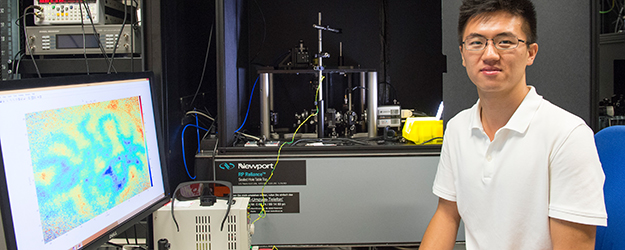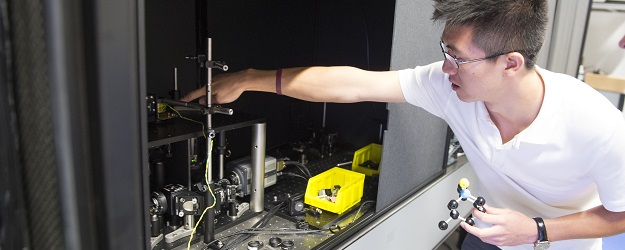A special internship program regularly succeeds in getting talented young people to come to the Johannes Gutenberg University Mainz’s PRISMA Cluster of Excellence – Precision Physics, Fundamental Interactions and Structure of Matter. Seven students were welcomed this summer. Zhiyuan Wang is one of them. He took the opportunity to work on his own project in nuclear physicist Prof. Dr. Dmitry Budker’s team.
Zhiyuan has only been in Mainz for about six weeks, but many of the scientists here at the Helmholtz-Institute (HIM) know him already. The 24-year-old is greeted several times during the short trek from the foyer to the laboratory where he conducts his experiments. He already belongs here, and he visibly enjoys the feeling. “I’m really glad to be here,” he says. “Everything is a bit more relaxed than in China or in the United States, even though people in Mainz work just as hard”.
Zhiyuan Wang is also known as Aaron here. He’s originally from the coastal metropolis Tianjin in northern China, a large city not too far from Beijing. The young man attended the University of California in Santa Barbara in order to study physics. It’s typical for Chinese students to choose a name which is easier for the hosts to pronounce in such cases, so Zhiyuan became Aaron.
Only the Best
“I decided on America in order to experience cutting edge physics,” he says. After he had received his bachelor’s degree, he was looking for new and interesting challenges when he came across the JGU’s PRISMA Cluster of Excellence and its international internship program. “I was especially interested in Professor Budker’s team. I had already heard of his research and I wanted to know if there was a chance I could take a look.” He received that chance through the university’s program.
“We bring capable new people from the whole world to Mainz with these internships,” explains Dr. Kevin Anding, who is responsible for Graduate Marketing and Recruiting at PRISMA. The program was initiated in 2014 and started picking up speed in 2015. “Since then, we have always been able to fill every slot. For this summer alone we had 50 applications for just seven internships, so we really can choose the best.”
A Research Project of His Own
Zhiyuan was one of them. He was part of nuclear physicist Prof. Dr. Dmitry Budker’s team for a month and a half. The University of California had played a major role for Budker, who is originally from Russia, as well. He earned his doctorate there before moving to the prestigious University of California, Berkeley, where he was a professor until 2014. Budker then followed the JGU’s call to PRISMA and HIM.
The Budker Lab is doing research on fundamental interactions and symmetries. In order to gather data in the experiments, the team has developed optical sensors based on atomic vapors and color centers in diamonds. Budker entrusted Zhiyuan with part of a project, which the student now explains to us in the lab.
He points to a black box. “Here’s where we aim a green light laser at a diamond we placed nitrogen atoms in.” The laser penetrates the gem, on which different samples can be placed. “Diamonds have a very stable structure, that’s why they are good sensors. The implanted nitrogen atoms create color centers in the diamond. They react to the laser according to the local magnetic fields and we can map the magnetic field created by the sample using that reaction. It’s my job to work on getting a higher resolution map. I’m experimenting with various lenses and changing the exposure times of single image recordings. To put it simply: I’m trying to get a better picture.” Zhiyuan was successful. In just these few weeks, he has proven himself to the Budker team.
A Sense of Community
“The labs here are wonderful and the atmosphere is really friendly,” Zhiyuan says of the working conditions at PRISMA. He’s also close to the six other students who received internships at PRISMA. “Our rooms are all on the same hallway in the dorms. There are people from Spain, Scotland, and Croatia here. It’s exciting to learn more about each of them and their cultures. We do a lot together and we’ve become friends.”
“We support this community spirit,” Anding comments. “We think connections like that will help tie talented young people to Mainz. This year we offered a trip to Rüdesheim by boat, a guided tour through our particle accelerator MAMI, a pub night and much more, so the students can get to know the region and the university together.”
Of course the scientific work is the most important aspect. “The special thing about our internships is that they were created around PRISMA. We can plan the students’ collaboration with our specific research groups. At the same time, we can cater to their individual needs: If someone comes to us from Glasgow, they have probably had a lot of theory and not much experimental work. They can get the practical experience in our lab, then.”
Zhiyuan Will Return
“I can highly recommend this internship,” Zhiyuan shares, “I feel at home here.” He already knows that he will return. Beginning in October 2018, he will be continuing research with the Budker team for ten more months. “Before this internship, Germany wasn’t really on my radar, but now I’m interested. I’ve been to Berlin; I visited museums and learned some about German history. When I come again in the fall, I will try to learn German.”
He likes Mainz. “It’s not too big, and at the university, at the Gutenberg campus, I fit in really well.” Zhiyuan is not sure yet where will end up studying for his master’s degree. But PRISMA has definitely left an impression he will remember.



